- Home
- Keith R. A. DeCandido
DIPLOMATIC IMPLAUSIBILITY Page 9
DIPLOMATIC IMPLAUSIBILITY Read online
Page 9
“Most of it. A security lockout kicked in about fifteen seconds after Lieutenant Toq identified them as Kreel.”
Worf nodded. Drex or Rodek had probably changed the security codes. “This is far from Kreel territory.”
“They may have come here in order to raid the hulks left over from the war. There were a lot of conflicts near here.”
“True. Still, it warrants investigating. Compose a report to Starfleet Intelligence on the Kreel’s new acquisitions, and then see if there are any reports of Kreel activity in this sector over the last six months.”
Making notes on his padd, Wu said, “Very good, sir.”
“What did you do?”
Vall looked up from his station in engineering. The harsh-voiced questioner was Commander Kurak. She stood with one hand gripping the wrist of her other arm, which usually meant she was angry.
She does that, Vall thought, far too often. His stomachs felt like they were trying to meld into one, and he struggled to keep down the racht he’d been snacking on.
“Ah—what did I do when?”
“The shields. What did you do?”
“The shot from the Kreel blew out half the inverters, but the systems were still operational—it was merely physical damage to the inverters. So I rerouted the systems through the backup matter/anti-matter injectors.”
“The injectors can’t handle that much raw power!” Kurak screamed. “You could have—”
Vall tried not to sink lower into his chair. “I—I modified the injectors with a conduit I designed a couple of years ago. It acts as a dampener while the energy goes through the injectors. It restored the shields to their former glory, and it would not have blown up the ship.”
Kurak advanced on Vall. Vall tried to back his chair farther away from her, but he was already up against the console.
“I will not tolerate this behavior any longer, Lieutenant. For a month, you have pestered me with ‘suggestions’ and ‘modifications.’ Your job as assistant chief engineer is to carry out my orders, and my orders are to keep ship’s systems operating within specified parameters—nothing more! Is that understood?”
“B-but, Commander—”
“Is that understood?”
Vall fidgeted in his chair. “Yes, Commander.”
“If you perform another modification like that without permission, I will kill you. Slowly. And painfully.”
Before Vall could reply, Kurak stomped out of engineering.
The other engineers went about their business, ignoring Vall. Technically, of course, Vall was their superior, though none of them treated him that way. Not that he minded. As long as they left him alone, he was happy, and they did that as long as Vall made them look good.
Heading to his quarters at shift’s end, he bumped into Toq in the hallway.
“Hello, Toq.”
“What do you want?”
“I—I am merely heading to my cabin.”
Toq laughed. “Then don’t let me get in your way.”
Vall continued to walk, then Toq called out his name.
“Yes?” Vall asked.
Toq turned and closed the distance between them. “Was it you who got the shields back up to full so quickly?”
Flattered at having his work recognized, Vall nodded.
“That was impressive work. Commander Kurak chose well when she made you her assistant.”
Vall shifted uncomfortably. “She didn’t. The original chief engineer died honorably in a duel. The commander was assigned after that, but the staff was already in place.” Quickly he added, “Not that she didn’t deserve it. She was the one who designed the previous flagship, the Negh’Var, before she joined the Defense Force. She was one of the greatest warp field specialists in the empire!”
“Commander Kurak’s life doesn’t really interest me,” Toq said dryly. “But you may want to share that information with Leskit, given the way he talked at dinner yesterday.”
“Perhaps that would be good for her,” Vall muttered. “Toq, I don’t know what to do. There are so many ways I could improve thi—”
“Vall, why are you here?”
Blinking, Vall said, “What do you mean?”
“You’re no warrior. What is a Grishnar cat like you doing among targs?”
Shaking his head, Vall said, “How come I’m not working at the Science Institute or something, you mean? My parents and sister asked me the same question. They thought I was insane—and that I’d be dead in a week. But I’m still here! I’m in the Defense Force! This is where history is made, where battles are won, not in the Science Institute. All the great stories are of war and battle—people like the captain and the ambassador. I want to be a part of that!”
Toq unsheathed his d’k tahg. Vall felt his racht coming up again. Toq and Vall were the same height and roughly the same weight, but Vall suddenly felt a good deal smaller. Toq stood so close to Vall that he could smell the grapok sauce on Toq’s breath, and the hairs of Toq’s untrimmed beard almost tickled Vall’s face.
“And what makes you think,” Toq asked with a vicious smile, holding the knife up to Vall’s throat, “that you deserve to be a part of that, Grishnar?” Vall saw a small, dark stain on the end of the blade, and wondered if that was Kegren’s blood. He thought he smelled blood, but that could’ve been his imagination.
“I—I do my d-duty, just as you do! A-and more! Right now, I’m going to fix Bekk Goran’s disruptor!”
Toq sneered. “Goran can get another disruptor.”
“N-no, he can’t! It’s been in his family for generations. He told me his great-grandfather used it on Organia—I don’t know if he speaks the truth, Dahar Master Kor only had a few troops on Organia—but he says he did, and he can’t get rid of it without dishonoring his House, but it doesn’t work properly, so he asked me to repair it, and I’m almost done, and I think he’ll be extremely angry if you kill me now.”
Vall inhaled sharply, having gotten that all out without taking a breath. He thought that if he paused to take a breath, Toq would slit his throat.
Toq leaned his head back and laughed heartily. Then, to Vall’s relief, he sheathed his d’k tahg. “You are—intriguing, Vall. You whine like a Ferengi, yet you perform magic with shields, make the first edible food I’ve had since I joined the Defense Force, and fix hundred-year-old disruptors. A Grishnar who survives among the targs.” He slapped Vall on the back.
Trying to keep his footing, Vall smiled nervously. “Thank you, Toq. If I may ask—what can I do about Kurak? I don’t understand her—you’d think she would want me to improve things. But she will not let me.”
“If she’s holding you back, Vall, there is only one thing you can do.” Toq once again unsheathed his knife. “Get her out of your way.” With that, he turned on his heel, said, “See you at dinner, Grishnar,” and walked off.
Wonderful, Vall thought. I’m probably stuck with thatnickname. But he’d been called worse.
Continuing to his quarters, he thought at Toq’s retreating back, It’s fine for you to say get her out of my way—you actually know how to use that d’k tahg of yours. All I can do with mine is cut dead meat and pry open control panels. If I challenge Kurak, she’ll hand me my head.
Or worse.
Sighing, he entered his quarters. He had a disruptor to fix.
B’Oraq approached the captain’s office. In one hand, she held a casualty report. She tugged on her braid with the other. She had been surprised at the summons requesting her to hand-deliver the report. It wasn’t necessary to provide it face to face; she could simply enter it into the computer, and Klag would have immediate access.
“Enter,” came Klag’s voice after the buzzer sounded. The doors parted loudly in response to the keyword.
She approached the desk, which naturally had no guest chair. “I have the casualty report,” she said, holding it up.
“And?”
“Some contusions, mostly from falling objects. The bulk of the injuries came in
the weapons bay—they lost gravity for two minutes. But no fatalities.”
“Good. The warriors of this ship deserve a better death than at the hands of the Kreel.” Klag spit, then reached for the report. “Thank you, Doctor,” he said as he took it.
“Captain, you didn’t need me to bring this in person.”
“No.” Klag set the report aside. “But I did need to discuss the medical ward manifest. Specifically, what is not on it. Commander Drex told me that you have several additional items. The commander referred to them as ‘unnecessary and barbaric medical equipment.’”
“Barbaric?” B’Oraq said with a bark of laughter. Drex had, of course, been referring to the prosthetics she had brought on board. “Captain, what is barbaric is—”
“Doctor,” Klag interrupted, “I realize you studied medicine in the Federation, so I’m willing to overlook that you forgot this is not a Federation ship—this time. We do not have a Starfleet vessel’s luxury of excess. Nonregulation equipment must be removed. Lieutenant Toq can see to its removal.”
“I’ll have him stop at your quarters then, too.”
Klag’s face darkened. “What?”
“If we don’t have the ‘luxury of excess,’ Captain, then those five cases of bloodwine in your quarters will have to go as well. I know for a fact that they take up more mass than my tiny cabinet of prosthetics.”
To her relief, Klag’s face broke into a wide smile. “I should have known that Ferengi had more than bloodwine in his cargo hold. Very well, Doctor, keep your vile toys. Though remember: eventually my bloodwine will be drunk. In fact, it’s already down to four cases. But those prosthetics of yours will molder in their cabinet.”
“Plastiform doesn’t molder, Captain,” B’Oraq said tightly, “and you’d do well to consider one of them. It would get rid of that phantom itch you keep complaining to me about. And you’d be able to fight with both hands again.”
“There are seven dead Jem’Hadar who can attest to my ability to fight with the one.”
The problem with heroes, B’Oraq thought, is that theytend to believe their own stories. “Really?” she said with a smile. “Tell me, Captain, why do the Gorkon and the other Qang-class ships have upgraded weapons systems? Why the increased sensor capacity? The better shields?”
Klag glowered. “What is your point, Doctor?”
“The old weapons systems worked just fine against the Dominion. We won the war, after all. So why the upgrades to this ship?”
“There is a difference between people and equipment, B’Oraq.”
“Yes, there is,” B’Oraq said, leaning down onto Klag’s desk and resting her palms so that she was face to face with the captain. “Equipment can be replaced. Adrenaline and surprise helped you defeat those Jem’Hadar on Marcan V, but another arm would’ve helped a lot more. Why make yourself an inferior warrior? It doesn’t change what you did at Marcan. People won’t stop singing about the heroic deeds of Klag, son of M’Raq, just because you replaced your right arm. And replacing it will increase the chances of there being more songs.”
Klag stared at B’Oraq for many minutes. B’Oraq found she could not read his expression.
“Dismissed, Doctor.”
B’Oraq straightened. At least he didn’t kill me, B’Oraq thought. She had half expected Klag to do so, particularly when she brought up the bloodwine. But then, she had expected to die every single time she suggested that empire medical standards were, in fact, substandard and in need of improvement. She never in her wildest dreams expected to get as far as designing her own medical ward. Each victory strengthened her convictions.
Leaving Klag’s office alive with a mere dismissal definitely constituted a victory.
She smiled and pulled on her braid. Now if I can just get him to replace the arm . . .
Chapter Four
THREE ARMED GUARDS—civilian, not Defense Force—scanned Klag, Worf, Drex, Krevor, and Klag’s guard the moment they materialized in the transporter room of Governor Tiral’s satellite. The guards each wore leather armor, loosely based on hundred-year-old Defense Force uniforms, before the combination of metal and leather became standard issue.
“All weapons are within expected parameters,” one of them said.
Another said, “Follow me.”
At first Klag bristled at the insult of being scanned, but he understood the need for security. Obviously Tiral feared for his life—and there was no honor in being assassinated by jeghpu’wI’.
The satellite had none of the austerity that Klag—having lived most of his life in the military, and before that as the son of an officer—had grown accustomed to. Instead of the standard Defense Force green, the walls here were a light brown, and were decorated—mostly, Klag noticed, with images of Tiral’s face. There were also slogans on the walls in a particularly ornate Klingon script: Death to the empire’s enemies, Long live the High Council, Glory to Governor Tiral, and others in that vein.
Several workstations lined the walls, operated by either Klingons or al’Hmatti. The ones operated by Klingons were cluttered with personal items: pictures, artwork, sculpture, miniature weapons, etc. Klag would never have allowed such luxuries on the Gorkon, but these were civilians. By contrast, the workstations occupied by the light-furred al’Hmatti—which were shaped differently to accommodate the ergonomic needs of a race evolved from ursine stock—were completely bereft of any decoration.
Tiral sat behind a large desk, cluttered with padds and remnants of food. He rose upon their entrance to his office, his belly scraping against the edge of the desk. The governor was shorter than Klag had expected. Rounder about the middle, as well. Too much time administrating, not enough time in battle, Klag thought. He wore the traditional ankle-length vest indicating the holder of a high office, though, unlike the similar one Klag wore, Tiral’s was lined with white fur. Under it, the governor wore a one-piece leather outfit that accentuated his rotund form.
“You are late,” Tiral said sourly.
“We were delayed,” Klag said.
Tiral seemed to expect more explanation, but Klag didn’t see that it was any of Tiral’s concern.
The three guards took up position behind Tiral’s desk. None of them holstered their disruptors. Three guest chairs sat opposite Tiral’s desk, and Klag sat in the middle one, with Drex on his right, Worf on his left. The two Gorkon guards stood at the door. Klag was tempted to have them unholster their disruptors as well, but decided that that was unnecessary. He preferred to show confidence rather than paranoia.
“So,” Tiral said with a small smile as he sat back down behind the desk, “my fortunes have finally changed. After months of the High Council ignoring my pleas, they send me the Hero of Marcan, the son of the chancellor, and the kingmaker himself. I have to wonder what I have done to suddenly earn this.”
Again Klag bristled, and this time he growled slightly. The High Council had granted Klag’s petition due to his status as a hero, and taken the taD situation seriously in part due to his pleas. Tiral’s implication that the current mission was a random event annoyed the captain.
“It is not what you have done, Governor,” Worf said. “It is simply a case of timing. The situation on taD could not receive proper attention from either the empire or the Federation because of the war.”
“I’m not clear what the Federation has to do with any of this, Ambassador,” Tiral said. “TaD is a Klingon world.”
“It wasn’t when the al’Hmatti appealed to the Federation for assistance,” Worf replied. “Nor was the Federation allied with the empire when that appeal was made.”
Klag added, “Ambassador Worf is in charge of this mission, by command of Chancellor Martok himself.”
Tiral pounded his fist on the desk, knocking two padds and some krada leg stubs to the floor. “This is outrageous! They are jeghpu’wI’. They have no more right to appeal to the Federation than my pet targ. I am responsible for this planet, Ambassador, and I will not have its fate decided by outsi
ders—especially not a coward who has lived his life among inferiors and who has twice been declared a traitor.”
Worf rose from his chair. “This meeting is over.”
“What?” Tiral and Klag said simultaneously. Klag wondered what the son of Mogh was playing at this time.
“There is no point to this,” Worf said to Klag. “The solution to what ails taD is obvious—replace the governor. I daresay the situation has gotten out of hand because its current leader is not fit for the job. As he himself said, he has been presented with the Hero of Marcan, the son of the chancellor, and a Federation ambassador. His response is to indulge in name-calling. Fit behavior for a tavern, perhaps, but not a meeting to settle an issue important to the empire.”
Tiral also stood up, this time unsheathing a d’k tahg. “You dare insult me?”
Behind him, the three guards moved forward, pointing their disruptors at Worf.
Worf ignored the guards and stared at Tiral without blinking. “I do not mean to insult, Governor. I have simply made a statement based on my interpretation of what I have been presented with. It is possible that my interpretation is in error.” He leaned forward, resting his fists on the desk, knocking two padds aside. “Convince me that it is.”
Klag watched the tableau with amusement. Much as Klag hated to admit it, Worf was playing this precisely the right way. Tiral was acting like a fool. If he took this to the next step and challenged Worf, it would simply prove Worf’s point.
Keeping his smoldering gray eyes on Worf, Tiral slowly sheathed his blade, sat back down, and said through clenched teeth, “Very well.”
The three guards lowered their weapons. Worf sat back down.
“I take it you are all familiar with the situation?” Tiral said, looking around the table.
“Yes,” Worf said. “The al’Hmatti rebels successfully overthrew the Klingon overseers. Governor Kalax put himself to death in disgrace, Captain Lornak’s fleet retook the planet, and you were assigned as the new overseer.”

 Alien
Alien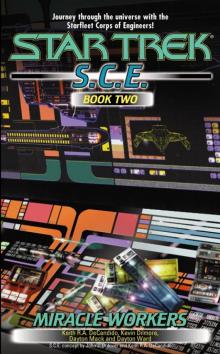 Miracle Workers
Miracle Workers Articles of the Federation
Articles of the Federation Supernatural Heart of the Dragon
Supernatural Heart of the Dragon War Stories: Book Two
War Stories: Book Two The Zoo Job
The Zoo Job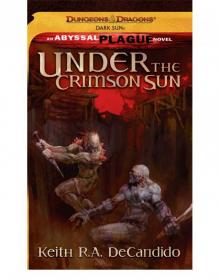 Under the Crimson Sun
Under the Crimson Sun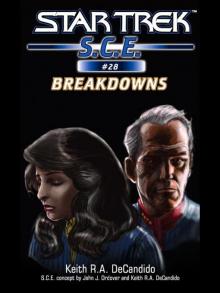 Breakdowns
Breakdowns Mermaid Precinct (ARC)
Mermaid Precinct (ARC) Supernatural 1 - Nevermore
Supernatural 1 - Nevermore STAR TREK - The Brave and the Bold Book One
STAR TREK - The Brave and the Bold Book One Four Walls
Four Walls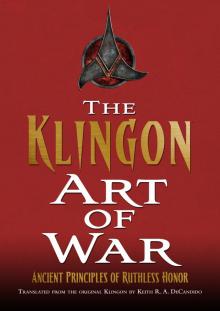 The Klingon Art of War
The Klingon Art of War Blackout
Blackout War Stories: Book One
War Stories: Book One The Brave and the Bold Book Two
The Brave and the Bold Book Two Honor Bound
Honor Bound Sleepy Hollow: Children of the Revolution
Sleepy Hollow: Children of the Revolution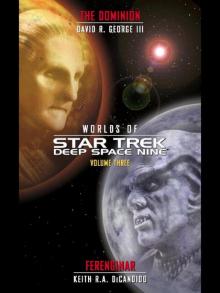 Worlds of Star Trek Deep Space Nine® Volume Three
Worlds of Star Trek Deep Space Nine® Volume Three Star Trek: TNG: Enterprises of Great Pitch and Moment
Star Trek: TNG: Enterprises of Great Pitch and Moment Genesis
Genesis Demons of Air and Darkness
Demons of Air and Darkness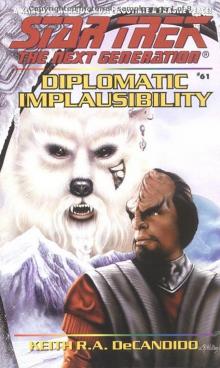 Star Trek - TNG - 61 - Diplomatic Implausibility
Star Trek - TNG - 61 - Diplomatic Implausibility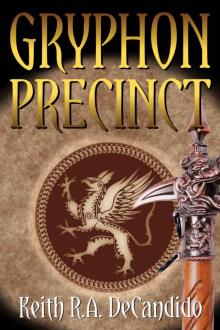 Gryphon Precinct (Dragon Precinct)
Gryphon Precinct (Dragon Precinct)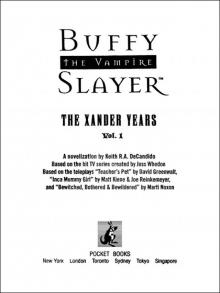 THE XANDER YEARS, Vol. 1
THE XANDER YEARS, Vol. 1 Nevermore
Nevermore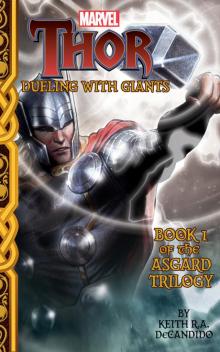 Thor
Thor The Brave And The Bold Book One
The Brave And The Bold Book One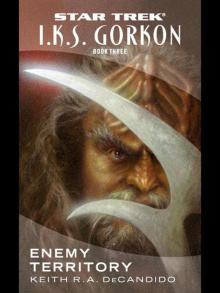 I.K.S. Gorkon Book Three
I.K.S. Gorkon Book Three STARGATE SG-1: Kali's Wrath (SG1-28)
STARGATE SG-1: Kali's Wrath (SG1-28) Bone Key
Bone Key Guilt in Innocece
Guilt in Innocece Star Trek - DS9 Relaunch 04 - Gateways - 4 of 7 - Demons Of Air And Darkness
Star Trek - DS9 Relaunch 04 - Gateways - 4 of 7 - Demons Of Air And Darkness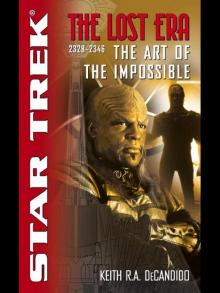 The Art of the Impossible
The Art of the Impossible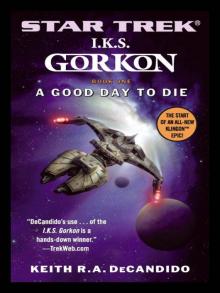 I.K.S. Gorkon Book One: A Good Day to Die
I.K.S. Gorkon Book One: A Good Day to Die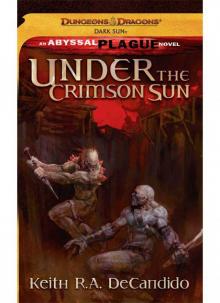 Under the Crimson Sun (the abyssal plague)
Under the Crimson Sun (the abyssal plague)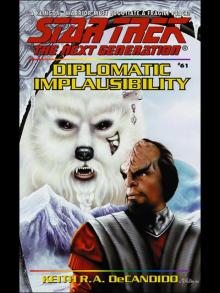 DIPLOMATIC IMPLAUSIBILITY
DIPLOMATIC IMPLAUSIBILITY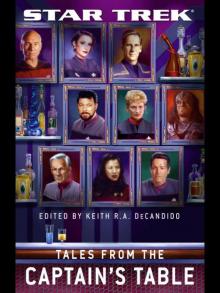 Tales from the Captain's Table
Tales from the Captain's Table A Burning House
A Burning House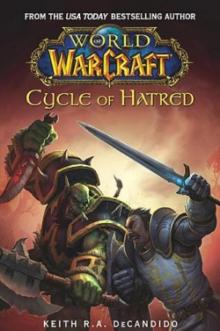 Cycle of Hatred (world of warcraft)
Cycle of Hatred (world of warcraft)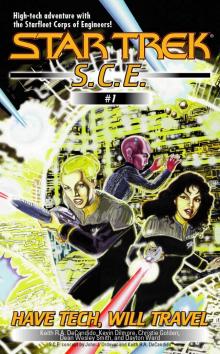 Have Tech, Will Travel
Have Tech, Will Travel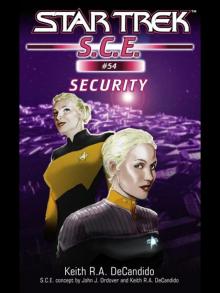 Security
Security